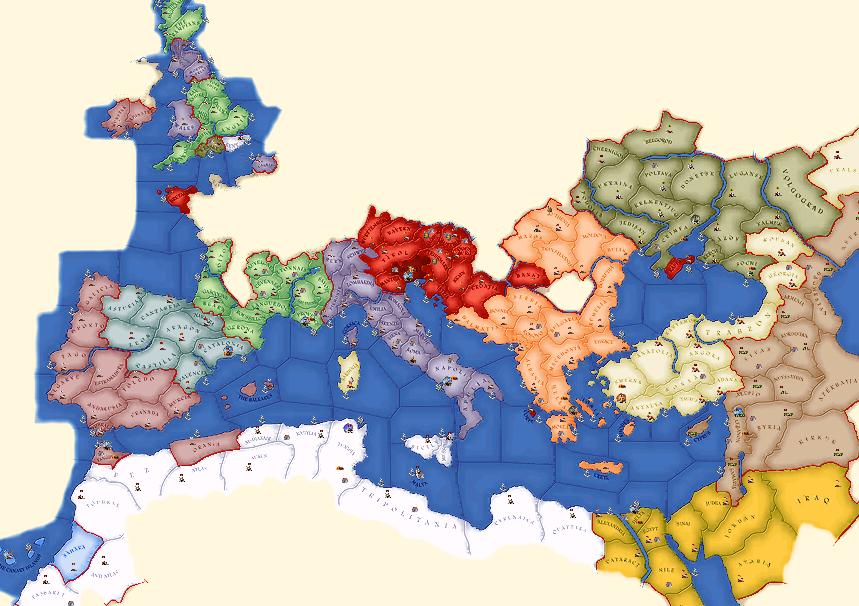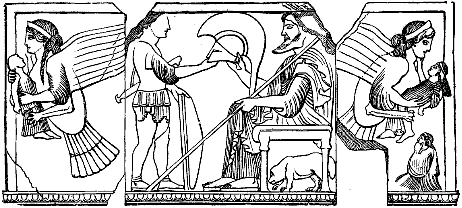A Tale of dread
Pelops recieved the call of the Gods, and he decided that indeed Theseus would be his target for punishment. Over-joyed he was when Bellerophon said he would aid in the punishment, and he declared war on the perpetrator.
Yet it would not be. Midas the greedy, coming from the far east, declared war on those who merely fulfilled the will of the Gods. And Bellerophon, who was after named the traitor, fought not a single battle and only stole the richest for himself.
Even so, Midas and Autolycus were both beaten off for a time, yet there was no lasting hope. In time, three against one was impossible to win, and Pelops signed thus a white peace.
This was unexpected, indeed, yet it was no disaster. For many years after, Pelops spent his time improving the weapons of his army, for Theseus would be coming back, deeming himself misjudged. He was not, but he WAS powerfull, and that counts for much in this world.
Yet the disaster was far greater.
For buried deeply in a pile of messages, Bellerophon sent a message declaring their alliance void. Bellerophon, who had used the exisatnce of an alliance as sufficient reason to attack one he claimed to not want to attack, had broken an alliance, and left Pelops to find out. No public announcements, nothing.
And then they struck.
From the vast expanses of Africa, from the rugged coasts of Iberia, and above all from the woodlands of Gaul, came a flood of enemies to drown the Peloponnesus.
And doom was certain, yet still Pelops fought Theseus, deeming yet that he may exact the punishment of the Gods, and later punish Bellerophon for his greater evil. Yet the superior weapons of Theseus proved too much, and allthough Perseus and Midas ended their war sooner, Pelops was still defeated by the unholy alliance of Bellerophon and Theseus.
Long would he mourn his pledges to Bellerophon, and he saw now that in the 4th Iberian war, when he was indeed winning, he should not have extended his hand in friendship but instead crushed the pest. Yet now Bearn the jewel of the realm, Toledo of the many mountains, and Tassaret with it's great temple to Hephaestos, were lost.
Many are the tales that mourn for the fallen, but none fell as far, or as quickly, as Bellerophon. For him, there would be no saving save in eternal death, no punishment could clear his soul save everlasting torment in Tartarus.
Yet, Pelops had no strength left in his realm, his armies defeated and his enemies united, and his belief in the good of men utterly crushed. Despair took him, for only half of the heroes of this world could possibly be classified as honourable, and the rest were either just selfish or outright scum.
He could but hope that, through a life of prayer and contemplation, the Gods would show him the way forward, so that his realm would not be destroyed by the unholy alliance, and that perhaps without needing again to defeat a stronger foe, he could fulfill the will of the Gods.
Pelops recieved the call of the Gods, and he decided that indeed Theseus would be his target for punishment. Over-joyed he was when Bellerophon said he would aid in the punishment, and he declared war on the perpetrator.
Yet it would not be. Midas the greedy, coming from the far east, declared war on those who merely fulfilled the will of the Gods. And Bellerophon, who was after named the traitor, fought not a single battle and only stole the richest for himself.
Even so, Midas and Autolycus were both beaten off for a time, yet there was no lasting hope. In time, three against one was impossible to win, and Pelops signed thus a white peace.
This was unexpected, indeed, yet it was no disaster. For many years after, Pelops spent his time improving the weapons of his army, for Theseus would be coming back, deeming himself misjudged. He was not, but he WAS powerfull, and that counts for much in this world.
Yet the disaster was far greater.
For buried deeply in a pile of messages, Bellerophon sent a message declaring their alliance void. Bellerophon, who had used the exisatnce of an alliance as sufficient reason to attack one he claimed to not want to attack, had broken an alliance, and left Pelops to find out. No public announcements, nothing.
And then they struck.
From the vast expanses of Africa, from the rugged coasts of Iberia, and above all from the woodlands of Gaul, came a flood of enemies to drown the Peloponnesus.
And doom was certain, yet still Pelops fought Theseus, deeming yet that he may exact the punishment of the Gods, and later punish Bellerophon for his greater evil. Yet the superior weapons of Theseus proved too much, and allthough Perseus and Midas ended their war sooner, Pelops was still defeated by the unholy alliance of Bellerophon and Theseus.
Long would he mourn his pledges to Bellerophon, and he saw now that in the 4th Iberian war, when he was indeed winning, he should not have extended his hand in friendship but instead crushed the pest. Yet now Bearn the jewel of the realm, Toledo of the many mountains, and Tassaret with it's great temple to Hephaestos, were lost.
Many are the tales that mourn for the fallen, but none fell as far, or as quickly, as Bellerophon. For him, there would be no saving save in eternal death, no punishment could clear his soul save everlasting torment in Tartarus.
Yet, Pelops had no strength left in his realm, his armies defeated and his enemies united, and his belief in the good of men utterly crushed. Despair took him, for only half of the heroes of this world could possibly be classified as honourable, and the rest were either just selfish or outright scum.
He could but hope that, through a life of prayer and contemplation, the Gods would show him the way forward, so that his realm would not be destroyed by the unholy alliance, and that perhaps without needing again to defeat a stronger foe, he could fulfill the will of the Gods.












